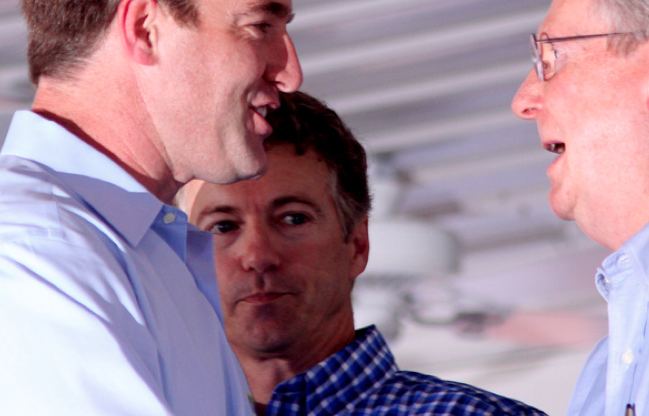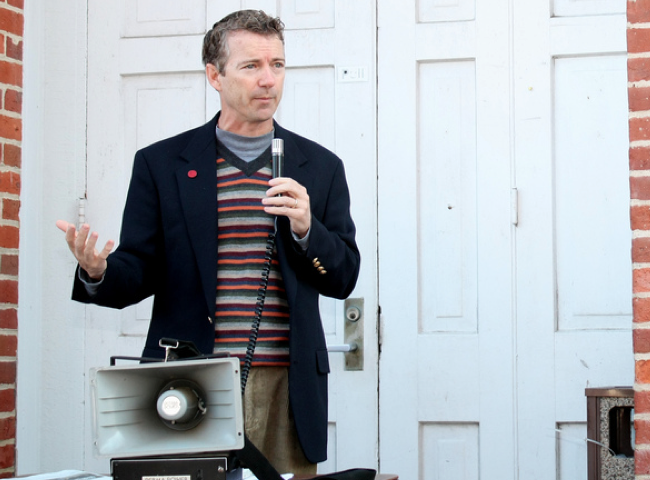The More You Hate Rand Paul, The More Kentucky Loves Him

Being from the state of Kentucky, you get pretty used to being the butt end of tired jokes. Whether it’s one of those uproarious “marrying your cousin” numbers needlessly tacked onto the end of an Alicia Silverstone movie or the classic “rides your horse to school” bit from some drunken Long Island-bred friend, the hits keep coming. And coming. And coming. Ironies be damned.
It happens so much that at some point you become inured and stop being appalled and hurt, at least outwardly. Whether it’s through attrition or ambivalence, you learn to chuckle it off with a knowing “Yeah, we’re pretty hilarious” and move on, forgoing outrage and internalizing the slight instead. Healthy? Probably not. It is what it is.
It is true that Kentuckians are generally, by nature, thin-skinned with long memories. That’s the feeling I came across most while working for my uncle’s GOP primary campaign last spring. As part of my duties, I did outreach among party activists, and seeing first-hand the hardcore Tea Party enthusiasts in action was illuminating. Their sense of outrage at perceived slights, and their coalescence around ciphers of outsider representation, seemed to jibe with what I have always considered a thread of mistrust woven deep into Kentucky’s social fabric.
Maybe it’s that negative popular image we’re so often reminded of that keeps us stewing or perhaps it’s something bigger-a sense of being outside culture’s good graces in a border state possessing neither Northern industriousness nor Southern antebellum gentility. In Kentucky, you’re in an indefinable kind of soft purgatory. Hell, our most famous folks are an arthritic chicken hawker and Florence Henderson, and possibly not in that order.
Such defensiveness has roots in the state’s class makeup, to be sure. Principally rural outside of two mid-size metropolitan areas, Kentucky long ago more or less abandoned Jeffersonian ideals of agrarian democracy. In its place was born a hard-edged tensile strength, epitomized by Abraham Lincoln’s log cabin upbringing. (Before Illinois stole him).
Kentucky used to-and in most corners of the state still proudly does-consider itself rough-hewn frontier country. Colonially an extension of Virginia, it was originally inhabited mostly by the intrepid and the damned, those restless souls who sought fortune or anonymity among its bountiful poplars and fertile soil.
But bolder pioneers kept moving west in search of riches, and the more industrious fled north to growing cities along the Ohio River and up to Chicago. Those who remained settled in for the long haul, for better and worse. As a result, what evolved was a proud people, girded by personal strength in the face of adversity, closely tied to a raw spirit of individuality and fiercely protective of their hard-earned freedom from the meddling intrusion of outsiders; in short, the kind of people you might expect to find in a mostly rural, often poor, landlocked region.
This is projection. But that zeitgeist, that preternatural urge for self-preservation and a natural distrust of the other, posits itself still among the Bluegrass masses, from its politics to its beloved basketball prowess.
From this came much of the support I witnessed last spring for Rand Paul. While our campaign courted Tea Party support and grassroots help, I was taken by the palpable excitement I found among Paul’s base. Merely appearing with Paul was juice to the electorate, and name-dropping him was voter enthusiasm manna.

Wiseacre liberals-and plenty of curious Republicans-across the country are enthralled by the exploits of this stiff ophthalmologist and legacy anti-politician bent on taking on the establishment, even within his own party. Simultaneously engrossed and outraged by his off-the-cuff neo-Libertarian ramblings, political watchers have taken to the story of the first-time candidate like few others this election season. Much of it seems a fascination akin to bird watching (“Look, honey, ridiculous plumage! And now he’s dancing!”).
But if the national press and the news-hungry have latched onto the more preposterous elements of Paul’s story-to wit, GQ’s recent kidnapping and idol-worshipping allegations-then most Kentuckians appear to have accepted Paul’s campaign as legitimate enough.
How else to explain his rump-kicking of the state’s hand-picked GOP successor in last May’s primary?
The son of a politician, Paul doesn’t hail from Kentucky originally. He settled there with his wife, a Bluegrass native, about 20 years back. What, then, about Paul is inherently Kentuckian is a bit tougher to say. But it isn’t a stretch to examine his lasting appeal in a state that, like the nominally Republican Rand Paul, exists forever “not quite”-neither flyover Midwest nor Deep South, neither Rust Belt nor Eastern establishment.
Bearing the state’s aforementioned history in mind is instructional when looking at the so-far success of Paul’s candidacy for U.S. Senate. In a state where registered Democrats outnumber Republicans mightily (despite recent trend of right-wing presidential winners there), it’s not surprising that it’s the state’s Republicans and Independents who most reflect the “us against the world” vibe. You’re looking at the skeptical and often insecure core of an already wary populace. No wonder, then, that Paul’s brand of Libertarianism plays well in these pockets.
This is not to dismiss those who find kinship with the substance of his governing philosophy (in that there is any governance in it). A hands-off, regulatory-free government fits the Kentucky mold neatly, appealing to the defensive and the free in equal measure, be they gun-toting or bong-loading.
But mostly, it’s been Paul’s shrewd use of the perception that they are all out to get him, and, by proxy, the citizens he represents, that has resonated. Ask many of his less dogmatic advocates for his policy positions and beyond a general “smaller government” theme, you’re more likely to get a diatribe on the media and governing elite rather than an exegesis of his tax proposals.
Fitting, then, that when cornered on the GQ allegations, Paul told FOX News, “I think they deserve a lawsuit. The problem is, in our country they make it almost impossible for politicians to win anything… we used to have journalistic ethics in this country… it’s so ridiculous I don’t know where to start.”
No one ever lost a vote in Kentucky for smacking “the media.” While Paul is certainly not the first to do it, he’s mastered the art in short order.
Another example surrounded a comment Paul made to Details magazine, much reproduced, that, “The bottom line is: I’m not an expert, so don’t give me the power in Washington to be making rules.”
At face value, it pretty clearly seems a ridiculous thing for anyone running for national office to say. However, examined in context, the quote was touching on a larger philosophy, one that has garnered him much of his hardcore support in his campaign. That is, if it’s not something that concerns you directly, then why are you so hell bent on regulating it?
Taken to a further end, it’s a representation of the height of outsider condescension. More simply: ‘Us vs. Them.’
But beyond his campaign’s “populist outrage,” Paul’s popularity has morphed into something of a personal crusade. Despite his many missteps and the big-foot punditry’s assumption that Paul would be exposed as the political neophyte he is, he’s still up in the polls. And every time a Rachel Maddow or Maureen Dowd lobs another poison-dipped pretension arrow at him, his fundraising numbers skyrocket.
Were it a simplistic Palin-esque folksiness, it might be easier to explain away. But like many Kentuckians past and present, quietly toiling amid the ancient mountain hollers and flat-as-a-board limestone plateaus that make up much of the state, Rand is smarter than he comes across. Like those he hopes to represent, he’s hesitant to reveal the breadth of his intelligence lest it be taken as bragging (or in his case misread by today’s electorate as being, God forbid, genuinely thoughtful).
But while possibly good campaign strategy, this reticence causes him trouble, since when he does decide to swan dive into ideological waters, he more often belly flops, appearing overly flippant or cerebral about topics of real import to real people. This is what befell Paul during his disastrous Maddow appearance in which he opened the door to re-examining the 1964 Civil Rights Act.
As policy, this would appear a heartless, borderline racist endeavor, given the sacrosanct nature of the Act and its legacy for huge swaths of the American populace. But what Paul was doing, in addition to tossing out rhetorical candy to his people, was getting theoretical in a cable news interview, something more seasoned politicians know they should not do.
And yet, while the feeding frenzy on the Sunday talk shows and chatter at the white wine brunches in Prospect Park might appear to inflict irreparable damage on candidate Paul, back home he continues on his merry way, greeting an increasing horde of well-wishers-principally independents and disgruntled Republicans finding in Paul’s emergence their own brand of “Change We Can Believe In.”
It’s all a bit schizophrenic, and I’d be hesitant to credit some balding political operative with creating it whole cloth, but it’s working for him right now. If these are pieces adding up to a mythology around what is, ostensibly, a politically nerdy and overly paranoid ophthalmologist from a sleepy country town in one of the least populous states in America, then it’s a little nugget of organic political beauty. Can you even name his Democratic opponent?
Whether such an erratic and ill-defined candidacy can carry Rand Paul first over the finish line remains to be seen. For now, those of us in the Bluegrass Diaspora will be forgiven if we offer a knowing shrug as we watch an adopted son suffer the slings and arrows of a smugly baffled political elite, all while outsidering his way to the anteroom of Washington’s most hallowed halls.
JL Weill lives in DC. He has, on multiple occasions, seen Donald Rumsfeld ordering coffee. His excursions in politics and culture take place at TheNewDeterrence.com.
Top photo by Gage Skidmore from Flickr.
Bottom photo by Rand Paul for Senate from Flickr.
